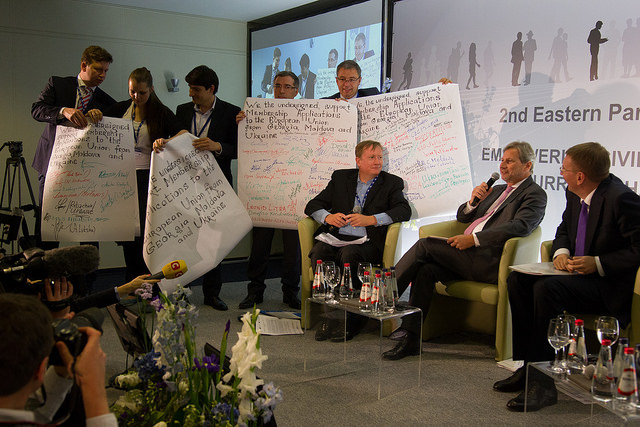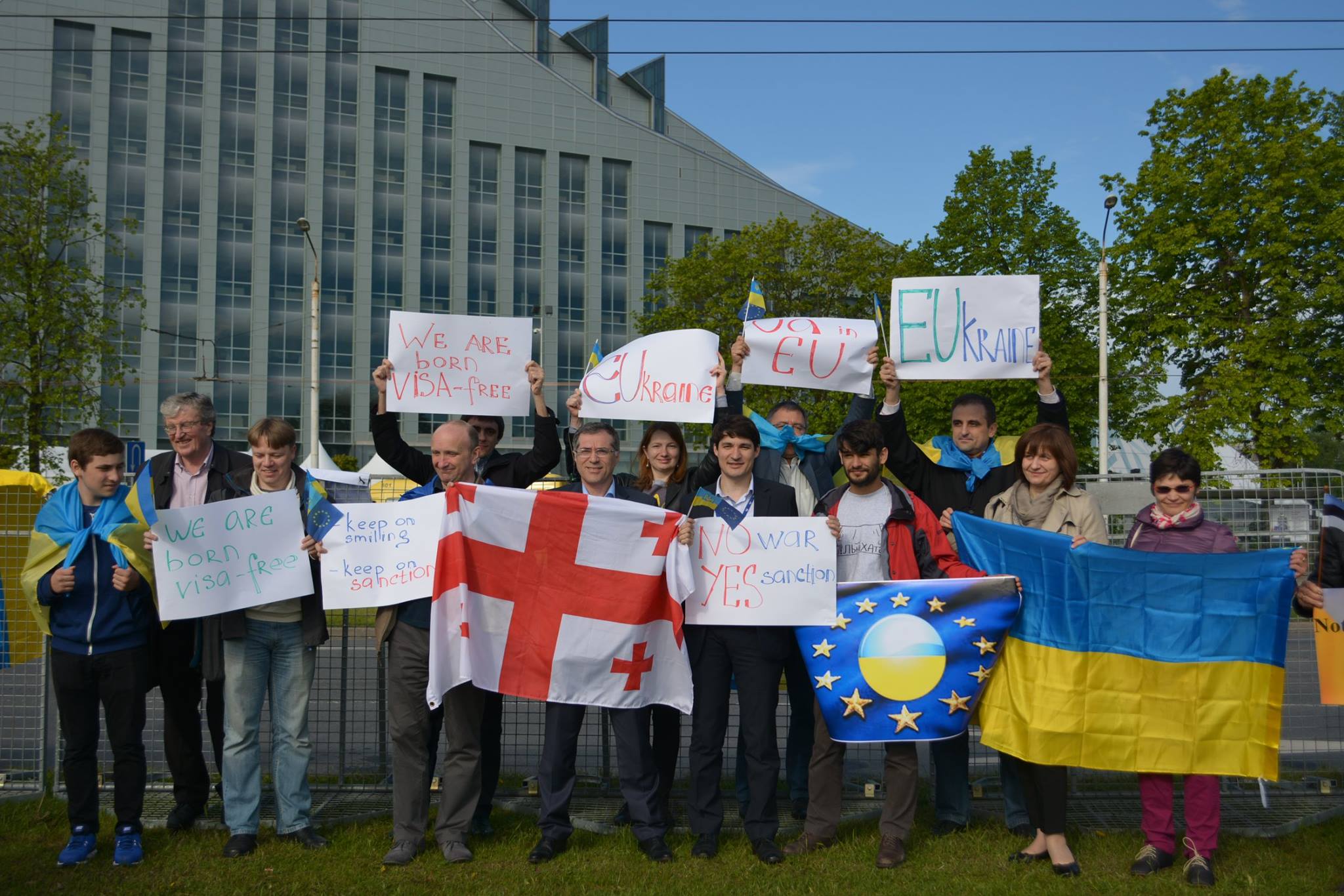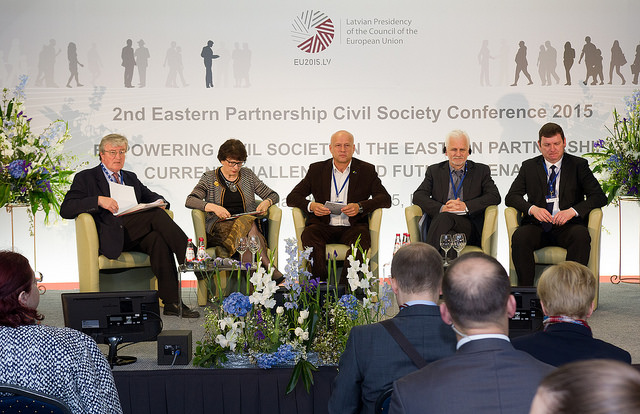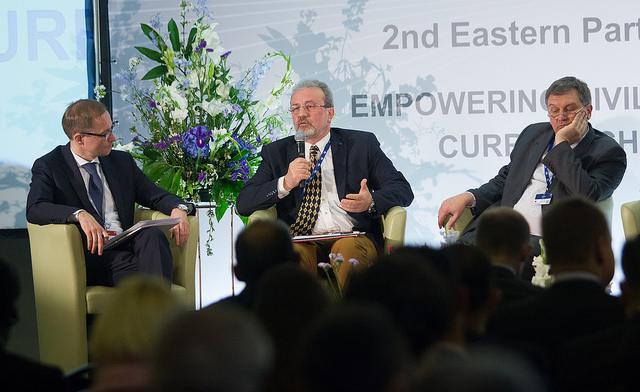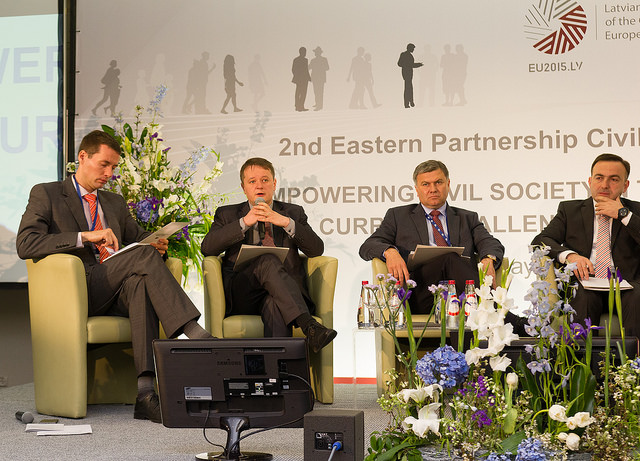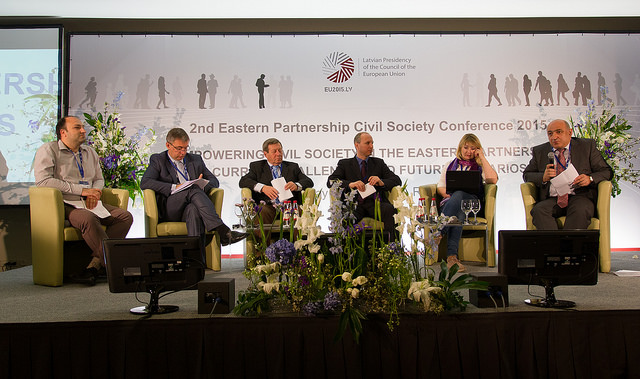|
IN THE SPOTLIGHT |
Eastern Partnership Civil Society Forum
|
|
Riga Highlights: EaP CSF Leading Change26 May 2015 On 19-21 May the members of the Eastern Partnership Civil Society Forum (EaP CSF) took part in 2nd Eastern Partnership Civil Society Conference (EaP CSC) and the 1st Eastern Partnership Media Conference held in Riga. Apart from being active participants, moderators and speakers, EaP CSF members organised a number of advocacy actions to draw attention of the decision-makers to the issues on the ground and urge the EU to take necessary steps. During the 2nd day of the EaP CSC the civil society from Georgia, Ukraine and Moldova submitted to Commissioner Hahn symbolic applications for the EU membership from their countries signed by the participants of the conference.
On 22 May on the day of the Eastern Partnership Summit the civil society representatives organised a demonstration in front of the Latvian National Library urging the Riga Summit to adopt a stronger declaration focusing on visa liberalisation for Georgia and Ukraine, EU membership perspective for the three EaP countries that signed Association Agreements and maintaining sanctions against Russia to ensure peace in Ukraine.
The Steering Commitee reacted to the the Riga Summit Joint Declaration regretting that it did not meet the expectations of the Georgian, Moldovan and Ukrainian people by omitting their countries’ right to apply for EU membership under Article 49 TEU reiterated in the conclusions of EaP Civil Society Conference. At the EaP Civil Society Conference the Co-chair of the Steering Committee Krzysztof Bobinski moderated the session on civil society as a strategic stakeholder in the Eastern Partnership with the participation of MEP Sandra Kalniete, chairman of the Belarusian Human Rights Centre ‘Viasna’ Ales Bialiatski and former Deputy Prime Minister of Ukraine Oleh Rybachuk. During the session Ales Bialiatski stressed that the EU should support civil society and independent media, not maintain incumbent undemocratic regimes. MEP Kalniete raised the issue of visa liberalization as the tangible achievement of the Eastern Partnership that Georgia and Ukraine should benefit from as soon as they meet the necessary criteria. Oleh Rybachuk emphasized that there is a lack of understanding of the civil society in the EaP countries and that the EESC (European Economic and Social Committee) method of civil society division into employers' organisations, trade unions and others is not necessarily applicable to the region.
During the session on the role of civil society in peace and prosperity reforms Georgian EaP CSF Working Group 2 Coordinator Kakha Gogolashvili delivered the message that Russian soft power and propaganda are still very powerful in Georgia and that along with the ENP reform the EU has to find new ways of engaging civil society in the national reform processes.
Steering Committee Member Mikayel Hovhannisyan moderated the session on finalising the EaP CSC conclusions. Steering Committee Co-chair Andrei Yahorau suggested that the current model of EU democracy support promotes incumbent governments, while grassroots movements are the engine of democratic transition, therefore EU should support trilateral dialogues between the EU, EaP states and civil society groups.
During the Media Conference and 2nd day of the Eastern Partnership Civil Society Conference Boris Navasardian spoke about the trends and challenges of the media environment in the Eastern Partnership countries and presented the monitoring report on messages of Russian TV. The format of the Civil Society Conference also included discussion in thematic working groups that later presented concrete recommendations. Speaking at the Working Group 1 “Accountable Governance and Civil Society” Lilia Carasciuc raised the issue of the state capture as a considerable challenge for reforms in Moldova. Jan Pieklo participated in the panel discussion of the Working Group 3 “Transborder Cooperation and Experience Exchange in Central and Eastern Europe” that focused on best practices and solutions, as well as cross-border advocacy. Forum members Fuad Hasanov and Iryna Sushko were speaking at the Working Group 4 on the role of mobility.
Oleksandr Sushko took the floor during the Working Group 1 session and later presented the recommendations during the final session. Steering Committee Member Oleg Shatberashvili presented recommendations of the Working Group 2 on sustainable business environment and social inclusion. Iryna Sushko presented the recommendations on Working Group 4 mentioning that visas will not stop illegal migration, and they are just administrative hurdles for the law-abiding population. Radio Free Europe coverage of the protest in front of the National Library in Ukrainian in English Reaction of the EaP CSF Steering Committee to the Riga Summit Joint Declaration |
Project funded by the European Union
![]()








